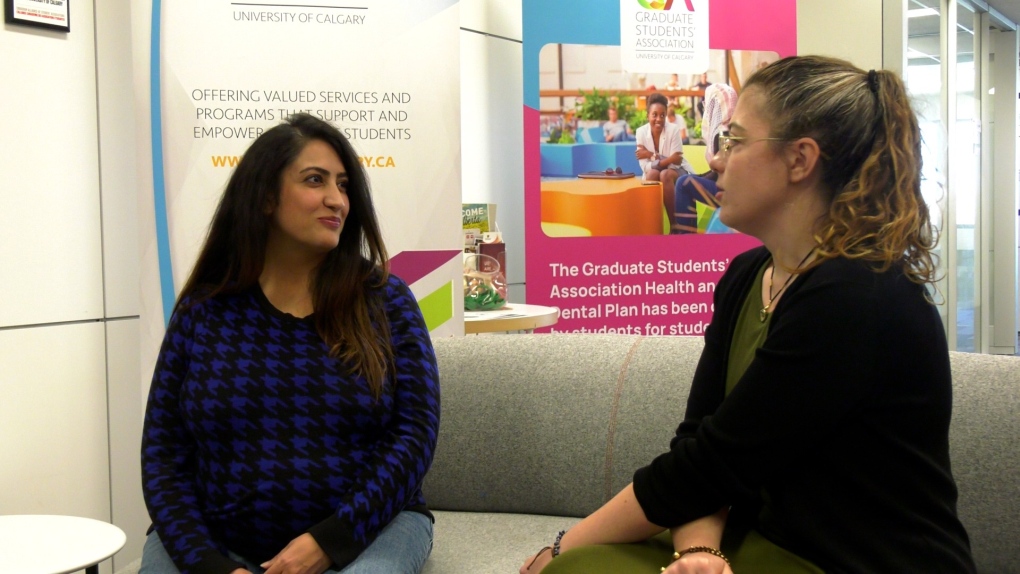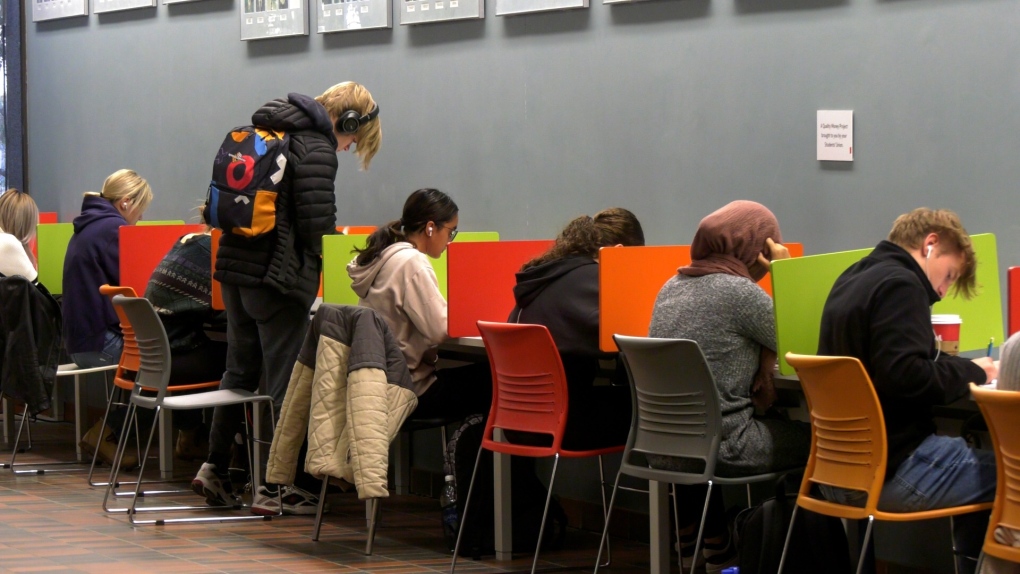University of Calgary grad students facing 'uncertainty' after recent immigration changes
International graduate students at the University of Calgary say recent changes to the cap on international students, along with more cuts to Canada's immigration targets, is causing uncertainty -- and could drive talent away from the country.
On Thursday, Prime Minister Justin Trudeau announced Canada would slash its immigration targets over the next three years and admitted the federal government "didn't get the balance quite right" in setting a target of 500,000 new permanent residents in both 2025 and 2026.
"This builds on our previously announced measures to cap international student permits and reform the Temporary Foreign Worker program, all of which we are implementing with a single aim stabilize our population growth to give all levels of government time to catch up," Trudeau said Thursday.
Next year's overall target for permanent residents will be now be 395,000, falling to 380,000 in 2026.
Rules change for international student study permits
This week's announcement comes just over a month after Ottawa changed its rules around international student study permits and post-grad work permits. The federal government reduced its target for international student permits to 437,000 until 2026 and removed the exemption for graduate students against the cap.
Among the changes that will impact international students joining master's, doctoral and postdoctoral programs are new language proficiency requirements, limits on work eligibility for spouses of foreign students and post-graduate work must be in high-demand fields.
The government is also reducing the number of temporary residents allowed in Canada from 6.5 per cent of Canada's total population to five per cent.
"When I heard the news, I felt a lot of fear and uncertainty about my own future here," said Alex Poppendorf, an international student from the United States who is PhD candidate in Educational Leadership.
"Now that I'm putting down roots -- I've fallen in love here, I found community here, I'd like to have a family here and a job here -- but these changes, which are changing, it feels like every day, throws all of that into uncertainty," she said.
 Next year's overall target for permanent residents will be now be 395,000, falling to 380,000 in 2026.
Next year's overall target for permanent residents will be now be 395,000, falling to 380,000 in 2026.
Poppendorf, who is also the Vice President Academic at UCalgary's Graduate Students' Association, said her fears are shared by many of the 7,000 international students at the post-secondary institution.
Ottawa has announced the sweeping changes to immigration in an effort to slow population growth and help address housing availability and affordability issues, the government said.
"You can't take a sledgehammer to fix what needs to be done with a scalpel. And I feel like I'm being sledge hammered rather than attended to as a human being who is contributing greatly to the economy," Poppendorf added.
Federal Immigration Minister Marc Miller previously acknowledged graduate students are "better prepared" and equipped for Canada's job market, especially in specialized fields. Twelve per cent of international student visas will be reserved for students in master's and PhD programs.
Nadia Ghazanfari holds a PhD in Translation Studies and is studying for her master's in Communications and Media Studies at UCalgary. She came from Iran to study in Canada and lives here with her son and husband, but says the recent changes have her feeling "a little bit of regret" and uncertainty about the future.
"When I came to Canada, it was with a specific plan that I'm going to go and do this education... and then I get the international work experience that I wanted to get in this field as it's not offered in my home country, and then return to my country with this sufficient academic and also work experience," she said.
Now, due to the changes in post-grad work requirements and study permit reductions, she isn't so sure.
"That's really hard to plan a future, especially as lots of these students, they're coming here to Canada with their families," Ghazanfari said.
It could also force students who are considering grad school to no longer consider Canada, she said, leading to needed talent going elsewhere.
"Canada is competing against the US, the UK and also Australia. So, I think these changing policies might greatly impact, not only the Canadian economy, but also the Canadian academic system," she said.
Must Watch
Top Videos
CTVNews.ca Top Stories

BREAKING 'Dangerous person alert' ended as police locate dead suspect in Calgary double murder
The suspect in a double homicide that took place in Calgary on Sunday night has been discovered dead by police.
3 min ago
Parts of Canada could welcome 2025 with glimpse of Northern Lights
While fireworks have become a popular way to celebrate the arrival of the new year, many Canadians could be treated to a much larger light display across the night sky.
2 hours ago
Debris found at St. John's airport after plane takes off, catches fire on N.S. runway
The Transportation Safety Board of Canada says it is investigating whether debris found on the runway of an airport in St. John's is connected to the plane that caught fire over the weekend after it landed on a Halifax runway.
1 hour ago
Border agents seize $2M worth of cocaine at Canada-U.S. border
Authorities at the Coutts, Alta., border crossing seized 189 kilograms of cocaine, with an estimated value of about $2 million, that was being shipped into Canada.
5 hours ago
Matthew Gaudreau's widow welcomes their first child months after his death
Four months after his death, the widow of Matthew Gaudreau announced the birth of their first child. Gaudreau, 29, and his NHL star brother Johnny Gaudreau, 31, were killed after being struck by a driver in August.
4 hours ago
Ontario labour ministry investigating injury on Toronto set of 'Beast Games'
Ontario's labour ministry is investigating an industrial accident on the Toronto set of 'Beast Games,' the newly released Prime Video competition series from YouTube star MrBeast.
4 hours ago
'McDonald's wouldn't open': Here are B.C.'s 10 worst 911 nuisance calls of the year
What do overripe avocados, stinky cologne and misplaced phones have in common? Generally speaking, none of them warrant a call to 911.
4 hours ago
Toronto police warn of extortion scam where suspects send victims 'graphic violent images'
Toronto police say they're receiving an 'increasing' number of reports about a scam where suspects send their victims 'graphic violent images' in an effort to extort money from them.
The best, worst and weirdest pop culture moments of 2024
You might not remember it all, but CNN took note of every niche pop culture oddity and TikTok fad. And no, perennial history-maker Taylor Swift didn’t even make the cut this year. Helming the highest-grossing tour ever is probably enough recognition.
3 hours ago


























































